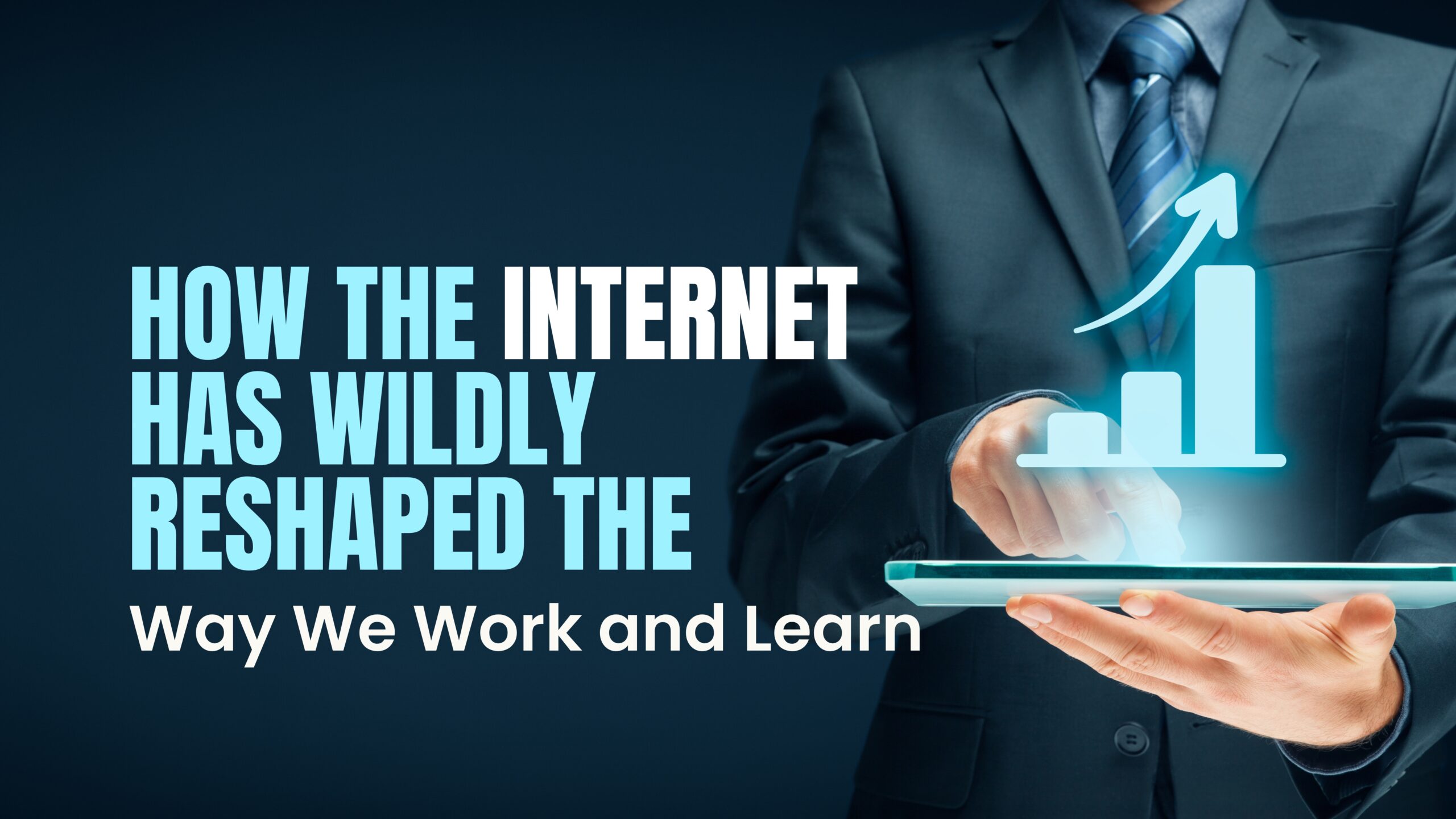Introduction: Wires, Wi-Fi, and a Whole Lotta Change
Somewhere between the rise of dial-up and the death of floppy disks, something happened.
We stopped commuting. We started Googling things we used to ask teachers. Jobs moved online. Learning turned asynchronous. (Weird word, right? Means you’re watching a lecture while eating cereal at 2 a.m.)
The internet didn’t just influence the way we work and learn—it cracked the ground open and poured in something electric, unpredictable, and deeply… human? Digital? Both?
Anyway—this isn’t just another tech-glorifying spiel. It’s about the messy beauty of how we got here—and how we’re still figuring it out.
Work: Not Just 9-to-5 Anymore (If It Ever Really Was)
Remote Work: Pajamas Are the New Power Suits
It’s not that we hate the office—okay, some of us do—but after COVID taught us that work doesn’t have to mean traffic, a lot of folks never looked back.
I remember typing up reports in bed during lockdown, cat asleep on my arm, my camera “mysteriously broken.” It wasn’t lazy; it was survival. And it worked. Tools like Slack, Zoom, and Asana became the new cubicle walls. But softer. Warmer.
Remote work isn’t a trend. It’s a revolution in a bathrobe.
Also, side note: hybrid models are basically the mullets of modern employment. Business up front (in-office), party in the back (WFH Fridays). And it’s… kinda perfect?
E-Commerce & Freelance Mania: Everyone’s a Boss Now
Shopify. Etsy. Fiverr. Even TikTok shops.
We’re all business owners now—or at least we like to think we are. There’s this intoxicating freedom that comes from turning your crochet hobby or sarcastic T-shirt designs into real revenue.
But here’s the catch: freedom comes with burnout. And algorithm anxiety. And shouting into the digital void, hoping someone buys your product (or clicks your link). Still—beats cold-calling, I guess.
Automation & Data: Our Machines Are Smarter Than Jeff from Accounting
Yes, it’s terrifying. But also exciting?
From self-checkout kiosks to AI-run logistics centers, businesses now rely on real-time data like it’s oxygen. We’ve got algorithms predicting demand, robots assembling packages, and smart fridges ordering milk when it runs low. (Why do I want one so badly?)
But—let’s not pretend everyone wins. Jobs disappear. Systems glitch. We’re faster, but maybe a little… detached?
Services at Your Fingertips: HR Has an App Now
Sick days? PTO requests? Benefits enrollment?
Click, scroll, done. You don’t have to walk down the hall to awkwardly talk to Barbara in HR anymore. (Sorry, Barbara.)
From healthcare to payroll, everything’s streamlined now. Efficient? Yes. A bit soulless? Also yes. But hey, at least you don’t have to remember where the fax machine is.
Global Collabs: “Let’s Circle Back” Across Time Zones
I once had a team meeting with someone in Manila, someone in Berlin, and a guy in Chicago who joined from his parked car during a blizzard. We brainstormed like we’d been in the same room for years.
The internet dissolved geography. Real talk, that’s magic.
But timezone math is a nightmare, and don’t even get me started on laggy connections mid-pitch.
Learning: Education That’s Chaotic, Beautiful, and Finally Yours
Unlimited Resources: From Textbooks to TikToks
Google is the new library. YouTube is a classroom.
Sometimes it’s helpful. Sometimes it’s… deeply unhinged.
I’ve learned how to change a bike tire, pronounce “quokka,” and write Python code—all online. But I’ve also gone down three-hour rabbit holes that ended with conspiracy theories about the moon landing. (It happened. Don’t argue.)
Still—students today have the kind of access my 10-year-old self could only dream of. Online encyclopedias, free PDFs, digital simulations—it’s like drinking knowledge from a firehose.
Personalized Learning: Because No One Likes Sitting in Rows
Some people thrive in silence. Others need lo-fi beats and a coffee the size of their face.
With MOOCs, Coursera, Skillshare, and random WordPress sites that somehow offer university-level courses—you can learn anything. Your way.
Want to major in ancient mythology and quantum computing? Go for it. Want to do it at midnight in your boxers? Nobody’s stopping you.
And if you fail, you just start over. No judgment. No deadlines. (Okay, maybe a little guilt.)
Virtual Classrooms: Everyone’s in Their Own Little Box
Zoom classrooms are weird. Like, weird-weird.
Sometimes you feel deeply connected. Other times, you’re just a muted rectangle watching another muted rectangle speak.
Still, students from wildly different backgrounds now study together. That cross-cultural magic? That never would’ve happened without the net. Exposure to new perspectives—whether it’s global politics or local slang—is an underrated superpower.
Education for Everyone: No Gatekeepers
The internet bulldozed the ivory towers.
Today, a kid in Ghana can access MIT lectures. A single mom in Ohio can finish her degree between shifts. You don’t need connections—you need connection. Wi-Fi, that is.
Knowledge is no longer a luxury. It’s a right—with a loading bar.
And if you’re curious enough? You can teach yourself literally anything (except maybe open-heart surgery—please don’t).
Research? A Breeze… Mostly
Academic journals. JSTOR. Google Scholar. Even Reddit sometimes (don’t judge).
Researching used to mean dusty books and librarians giving side-eye. Now it means tabs. So many tabs. Too many.
But be careful—some “facts” are just confidently-written nonsense. And plagiarism? Easier to do… easier to get caught.
Challenges, Because Not Everything Is Rainbows and Reels
The Digital Divide: Not Everyone Gets a Fair Shot
Wi-Fi deserts are real.
Some kids still sit outside fast food joints just to access homework portals. Rural towns, low-income families, even whole nations are left buffering while the rest of the world speeds ahead.
We’ve gotta fix that. Full stop.
Distractions: The Internet’s Favorite Weapon
One second you’re watching a biology lecture.
Next thing you know, you’re deep in a rabbit hole about ancient alien theories and somehow ended up shopping for ceramic frogs on Etsy.
The internet is a genius… and a time thief. Manage your tabs—or they’ll manage you.
Digital Literacy: Knowing Where the Truth Isn’t
The worst part about the internet?
It never shuts up.
So you need to know what to trust. Not everything with a graph is science. Not every influencer knows what they’re saying. And not every site with “.org” is noble.
Teach kids (and adults, honestly) how to think online, not just scroll.
Conclusion: We’re In It—Might As Well Thrive
The internet didn’t ask permission to change our lives. It just did.
And yeah, it’s chaotic. Glitchy. Emotionally overwhelming sometimes.
But also—liberating. It’s allowed us to dream bigger, move faster, and connect in ways we never imagined. You can build a career from a laptop in a hammock. You can learn a new language from a chatbot. You can teach, lead, innovate… all while barefoot in your living room.
So let’s embrace it—but carefully. With empathy. With a better router. And maybe with a little less doomscrolling before bed.
FAQs
Q: What are the benefits of online learning in 2025?
A: Flexibility, personalization, accessibility, affordability. Oh, and pajamas. Don’t forget pajamas.
Q: How has remote work changed businesses post-pandemic?
A: It’s redefined productivity, expanded talent pools, reduced overhead costs—and made meetings more awkward (but shorter).
Q: Is the internet really making learning better?
A: Yes. But only if we use it wisely. It’s a tool, not a teacher. The magic still comes from you.









